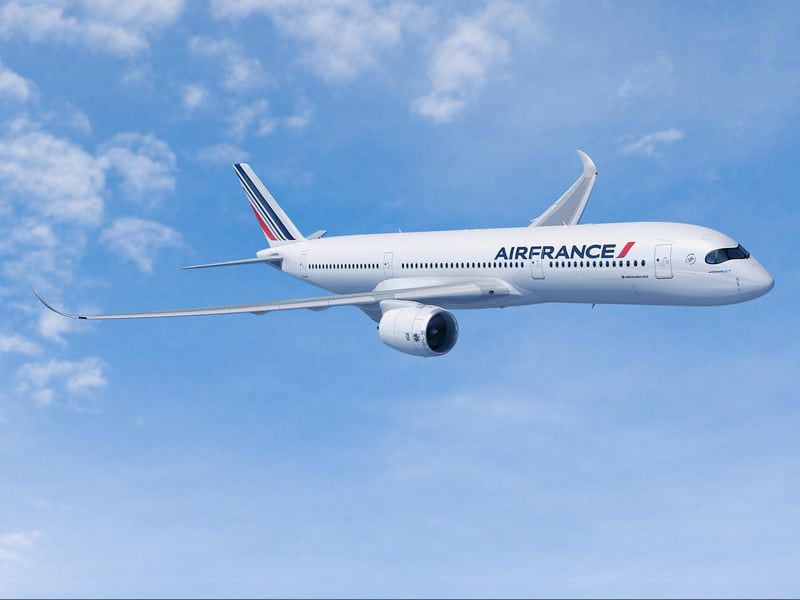
An Air France Airbus A350. (Airbus)
A new IATA study on French airspace projects up to a 59% increase in passenger departures over 20 years, from 89.4 million to 142 million, marking significant economic opportunity, but only if the country takes steps to modernize regulation.
Failing to do so would mean foregoing up to $66 billion in GDP, according to IATA Economics in the report compiled jointly with France’s National Federation of Commercial Aviation and Board of Airlines Representatives.
Those numbers are both the high end of IATA’s projections. Air transport accounted for about $112 billion, or 4.6 percent of France’s GDP as of 2017, according to Oxford Economics. IATA says that could grow to anywhere from $142 to $178 billion by 2037, with a current projection of $165 billion. The current projections also include increases from 89.4 million to 131 million passengers and 1.1 million to 1.4 million jobs.
To help it reach those loftier numbers, IATA says it must make some changes to better facilitate air travel for passengers and operators.
“Aviation is the business of freedom, and already creates considerable benefits for France,” said Rafael Schvartzman, IATA Regional Vice President for Europe. “But France’s competitive position in Europe is notably weak in infrastructure costs, air traffic management efficiency, the quality of regulation, and the costs of social charges. There are huge opportunities for more jobs and greater economic growth if these weaknesses are addressed.”
IATA synthesized its assessment into three primary recommendations:
Reform airport and passenger charges.
France has among the highest airport and passenger fees in Europe, according to data from IATA, the International Monetary Fund and other groups. Poland is on the low end and the U.K. considerably outpaces the field for most-charged country, but France is in the top five.
In particular, the report singled out France’s Air Passenger Solidarity Tax as being “discriminatory” for only impacting air travel and suggested abolishment or overhaul. The need to reform taxes on aviation and the regulations by which charges are made is particularly critical in light of the fact that the country is considering the privatization of its airports, IATA said, highlighting the upcoming development of Terminal 4 at Paris’ Charles de Gaulle Airport as an opportunity for increased transparency and fairness.
France needs a more consistent airspace system.
In particular, the report highlights a requirement that air traffic controllers provide 72 hours’ notice before a strike to avoid “inefficient and expensive coordination of airspace in France.” The World Economic Forum in 2017 ranked France the fifth-worst in Europe when it comes to labor efficiency.
Burdensome regulations, another bottom-five area for France.
According to IATA, there is “a need for a systematic approach that would show how the current consultation process impacts regulatory implications and delivery.”
Across the French economy, the association said, regulations “cause confusion and uncertainty.” IATA has a principle set called “Smarter Regulations” that it recommends which advocate for clear, evidence-based goals and the least burden possible while accomplishing those goals. One example it provided was switching from a heavily tax-based system to promote ICAO’s Carbon Offsetting and Reduction Scheme for International Aviation (CORSIA) system for carbon dioxide mitigation.
“We have ambitious global targets for carbon-neutral growth from next year, and to cut net emissions to half of 2005 levels by 2050,” Schvartzman said. “These targets are compatible with the wider goals of the Paris Agreement. CORSIA will generate $40 billion in finance for carbon reductions, but it needs strong support from the French government to ensure its success. Key to that is to resist calls for unilateral measures such as aviation climate taxes, which will provide no environmental benefit and could undermine the international consensus for combined action on aviation carbon emissions.”
In compiling the report, IATA looked at France in five arenas it calls competitiveness indicators: passenger facilitation, cargo facilitation, supply chain management, infrastructure management and the regulatory environment.
As reflected by IATA’s recommendations, France’s worst performance was in regulatory environment, where it earned a 4.6 out of 10, well below the regional average of 5.2. The country’s second-lowest score, a 4.8 in passenger facilitation, actually outdid the regional average, but the report still highlighted it as an area of concern for facilitating operational growth, citing restrictive visa rules.
A 6 in cargo facilitation was dragged down by poor performance in e-cargo, the report said. Infrastructure management’s 6.1 was well above the regional average of 5.6, while France’s highest score, a 6.7 in supply chain management, fell below a 7.2 regional average in the category. High charges and taxes were the contributing factor in the relatively lower score there.
For more information on the report, the data sources and methodology used by IATA and its French partners, refer here.